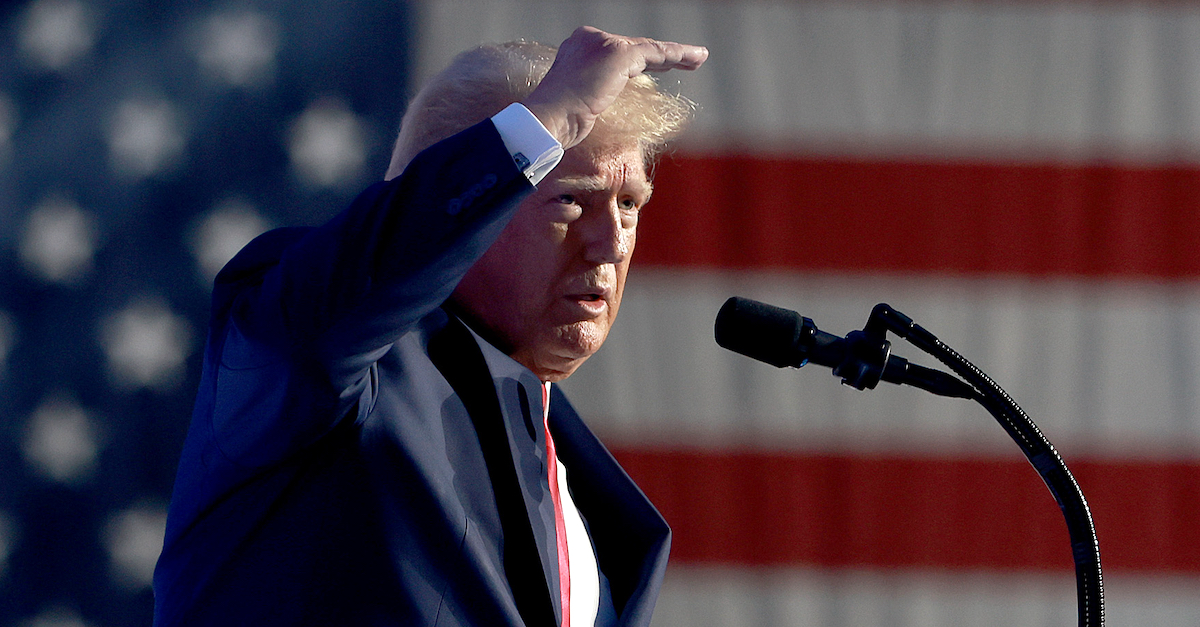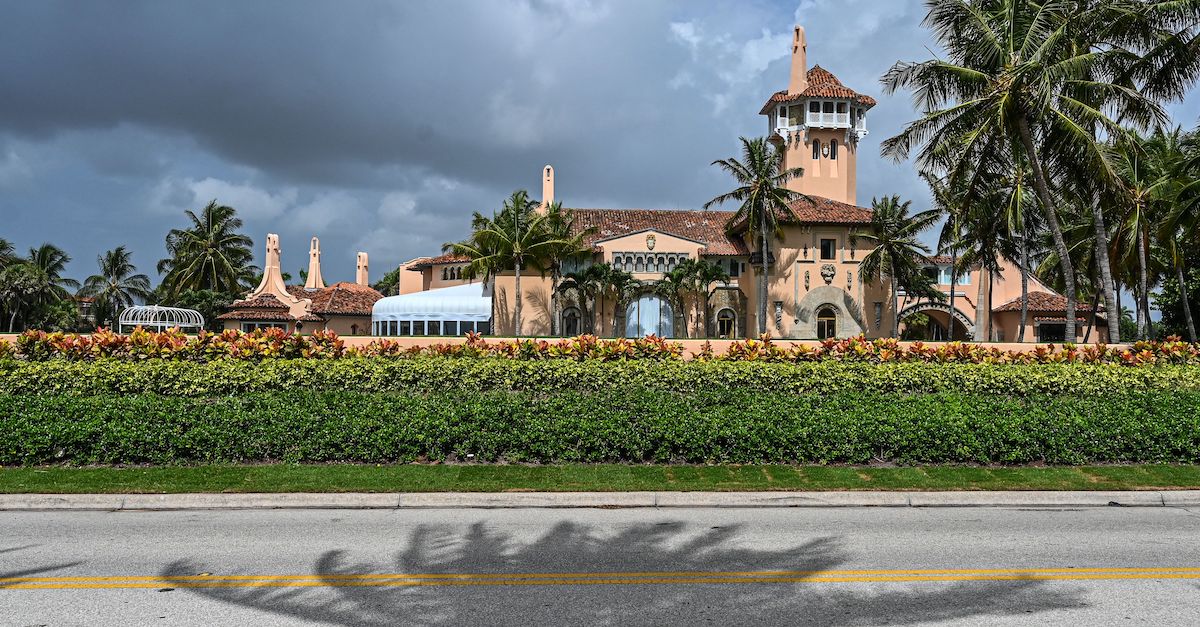
Former U.S. President Donald Trump speaks during the Turning Point USA Student Action Summit held at the Tampa Convention Center on July 23, 2022 in Tampa, Florida. (Photo by Joe Raedle/Getty Images.)
A federal magistrate judge on Monday filed a 13-page document to memorialize what portions of a search warrant affidavit aimed at Donald Trump’s palatial Mar-a-Lago estate might (and might not) be divulged to the public.
The warrant affidavit in question — the most-anticipated legal document in recent memory — was executed Mon., Aug. 8; U.S. Magistrate Judge Bruce E. Reinhart issued it three days earlier on Fri., Aug. 5.
Reinhart seems zeroed in on several particular classes of information that almost surely will not be released. Those areas include materials connected to secret grand jury proceedings, the identities of key witnesses, the identities of law enforcement officers, data about the layout of Mar-a-Lago itself, investigative techniques used by federal authorities, information that could result in the future obstruction of justice, and facts that could lead to reputational harm if no charges are filed.
A collection of news organizations and watchdog groups filed motions to unseal the affidavit that led to the warrant. Affidavits generally are layouts of the precise facts and circumstances that led a law enforcement officer’s conclusions that fruits of a crime might be present in a particular location to be searched.
Significant portions of what Reinhart called the “warrant package” have already been made public. Those documents include a criminal cover sheet, an application for a warrant, a proposed warrant, a motion to seal the documents related to the application, and a proposed order to effectual the requested seal. A mildly redacted inventory — a description of what was taken — has also been made public.
Those documents, Reinhart noted, “are redacted only to conceal the identities of an Assistant United States Attorney and an FBI Special Agent” — a move he said was “appropriate to protect the identity and personal safety of the prosecutor and investigator.”
The affidavit, however, remains sealed.
On Monday, Reinhart wrote that he issued the warrant “after finding probable cause that evidence of multiple federal crimes would be found” at Mar-a-Lago.
“Neither Former President Trump nor anyone else purporting to be the owner of the Premises has filed a pleading taking a position on the Intervenors’ Motions to Unseal,” Reinhart also noted. (Trump has asserted on social media that such a filing was in the works, but nothing has yet been filed.)
Federal prosecutors admitted that they bear the “burden of justifying why the Affidavit should remain sealed,” the magistrate judge continued. After several pages recapping First Amendment and common-law rules that govern access to court records, Reinhart concluded that the difference between those sources of law was not one worth settling in this case because the core question under both analyses was roughly the same: whether the entire document must remain secret or whether a “less onerous . . . alternative to sealing” the document would work.
Prosecutors argued that “unsealing the Affidavit would jeopardize the integrity of its ongoing criminal investigation,” Reinhart noted. Specifically, the government feared revealing “critically important and detailed investigative facts,” including “highly sensitive information about witnesses, including witnesses interviewed by the government; specific investigative techniques; and information required by law to be kept under seal pursuant to Federal Rule of Criminal Procedure 6(e).”
The rule referenced involves the secrecy of grand jury proceedings — which, here, are apparently ongoing.
“Criminal investigations are one such government operation” that can, at times, require secrecy, Reinhart indicated. “The Intervenors [that is, the watchdog and media groups] agree that protecting the integrity of an ongoing criminal investigation can, in the right case, override the common law right of access.”

Former U.S. President Donald Trump’s residence at Mar-A-Lago, in Palm Beach, Florida, was photographed on August 9, 2022. (Photo by Giorgio Viera/AFP via Getty Images.)
Reinhart then expounded on what types or categories of information could legally be kept a secret in spite of the general presumption of openness (again, citations omitted):
In the context of an ongoing criminal investigation, the legitimate governmental concerns include whether: (1) witnesses will be unwilling to cooperate and provide truthful information if their identities might be publicly disclosed; (2) law enforcement’s ability to use certain investigative techniques in the future may be compromised if these techniques become known to the public; (3) there will be an increased risk of obstruction of justice or subornation of perjury if subjects of investigation know the investigative sources and methods; and (4) if no charges are ultimately brought, subjects of the investigation will suffer reputational damage.
[ . . . ]
The same concerns also apply to a pre-indictment search warrant. At the pre-indictment stage, the Government’s need to conceal the scope and direction of its investigation, as well as its investigative sources and methods, is at its zenith. Maximizing the Government’s access to untainted facts increases its ability to make a fully-informed prosecutive decision while also minimizing the effects on third parties.
Here, those concerns were on the top of Reinhart’s mind.
“As the Government aptly noted at the hearing, these concerns are not hypothetical in this case,” he wrote. “One of the statutes for which I found probable cause was 18 U.S.C. § 1519, which prohibits obstructing an investigation. Also, as some of the media Intervenors have reported, there have been increased threats against FBI personnel since the search.”
Those reports, Reinhart indicated, included an attack on an FBI office in Cincinnati on Aug. 11. They also included reports that a “public release of an unredacted copy of the [post-search] Inventory” resulted in threats and harassment against the “FBI agents involved in this investigation.”
“Given the public notoriety and controversy about this search, it is likely that even witnesses who are not expressly named in the Affidavit would be quickly and broadly identified over social media and other communication channels, which could lead to them being harassed and intimidated,” the magistrate judge concluded.
Reinhart said he was also moved by government fears that the disclosures of particular witnesses, investigative techniques, and the revelations of secret grand jury proceedings “would detrimentally affect this investigation and future investigations.”
Additionally, the magistrate judge voiced concerns that the affidavit “discusses physical aspects” of Mar-a-Lago, a “location protected by the United States Secret Service.”
“Disclosure of those details could affect the Secret Service’s ability to carry out its protective function,” he said. “This factor weighs in favor of sealing.”
Because issues surrounding Trump are “matters of significant public concern,” however, and “unsealing the Affidavit would promote public understanding of historically significant events,” Reinhart said he was inclined to unseal portions of the document in question.
Having so concluded, Reinhart admitted that the government argued that any ensuing redactions “would be so extensive as to render the document devoid of content that would meaningfully enhance the public’s understanding” of what was occurring.
“I cannot say at this point that partial redactions will be so extensive that they will result in a meaningless disclosure, but I may ultimately reach that conclusion after hearing further from the Government,” Reinhart said — thus putting the ball back into the court of federal prosecutors to deliver a document with proposed redactions.
A blacked-out document is due to the judge by Thurs., Aug. 25, at noon. Reinhart rubbished suggestions by the government that it would be too labor intensive to produce such a document.
The magistrate judge filed the opinion just hours before prosecutors indicated they did not oppose unsealing four other documents connected to the Mar-a-Lago probe. Those documents, which were swiftly unsealed around noon Eastern time on Monday, were perfunctory requests to seal certain materials — but they contained a caveat that Trump’s attorneys should be given access to some, but not all, of the paperwork in case his lawyers wished “to intervene in pending litigation concerning the unsealing of these materials.”
Reinhart’s opinion is below; so is a document which contains the sections of the warrant package that have already been made public.